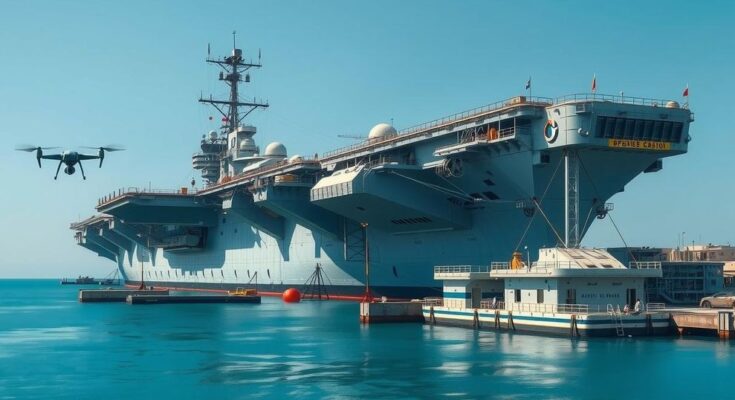Indonesia is considering purchasing Italy’s decommissioned aircraft carrier, Giuseppe Garibaldi, to enhance its naval drone operations as part of a broader defense strategy. This acquisition aligns with Indonesia’s recent agreements for the production of naval drones and reflects the strengthening defense cooperation between Indonesia and Italy. The Giuseppe Garibaldi, originally commissioned in 1985, served multiple roles and underwent extensive modernization before its decommissioning in 2024.
On March 11, 2025, the Rivista Italiana Difesa reported that Indonesia is exploring the acquisition of Italy’s decommissioned aircraft carrier, Giuseppe Garibaldi, for naval drone operations. This prospective deal would align with Indonesia’s agreement with Turkish company Baykar to produce 60 navalized TB-3 drones and nine Akinci UAVs locally. The partnership between Indonesia and Italy has strengthened in recent years through collaborations in ship acquisitions and defense industries.
Commissioned in 1985, the Giuseppe Garibaldi was Italy’s first anti-submarine warfare carrier featuring a full-length flight deck. Initially limited to helicopters, it was retrofitted for AV-8B Harrier II fighter jets after legislative changes in 1989. Throughout its service, the ship underwent significant upgrades, particularly a modernization in 2003 and an overhaul in 2013 to extend its operational life.
The carrier has a standard displacement of 10,100 tons and a top speed exceeding 30 knots, powered by four General Electric/Avio LM2500 gas turbines. The ship accommodates a crew of up to 830 personnel and is outfitted with advanced radar systems, air defenses, and electronic warfare capabilities. Its aviation capacity supports the operation of various aircraft configurations, mainly targeting anti-submarine warfare and logistics.
The Giuseppe Garibaldi has participated in numerous military campaigns, including NATO operations in Kosovo, Afghanistan, and Libya. It was decommissioned on October 1, 2024, following nearly four decades of service, and replaced by the Trieste-class landing helicopter dock, which enhances Italy’s amphibious capabilities.
With Indonesia’s Minimum Essential Force (MEF) plan, the acquisition of the Giuseppe Garibaldi appears relevant, particularly for non-combat military operations. Plans for this acquisition include obtaining two frigates from Italy and fast missile-armed patrol boats from Turkey. The Indonesian Parliament approved a grant from Japan for two patrol vessels, fortifying security near the new capital, Nusantara.
The potential conversion of the Giuseppe Garibaldi into a drone carrier may bolster Indonesia’s defense capabilities. The TB-3 drones, produced through a joint venture between Baykar and Indonesian firm Republikorp, are tailored for launch from ski-jump ramps, making the Garibaldi an ideal platform for their operations.
Additionally, Indonesia’s past experiences with former Italian Navy vessels reflect its commitment to deepening defense ties. The successful renaming ceremony of two Multipurpose Combat Ships highlights this ongoing relationship. If negotiations for the Garibaldi progress, there may be a possibility of transferring AV-8B Harrier II aircraft as well; however, alternatives, such as constructing domestic amphibious ships, are also being explored.
Amidst a backdrop of evolving maritime security challenges, particularly in the South China Sea, Indonesia’s naval modernization campaign emphasizes the importance of rapid-response capabilities across its extensive archipelago. Analysts suggest that while an aircraft carrier acquisition holds appeal, practical considerations, including logistics and budget constraints, may favor acquiring additional multi-role support ships or landing helicopter docks instead of a conventional carrier.
In summary, Indonesia’s interest in acquiring the Italian aircraft carrier Giuseppe Garibaldi underscores its commitment to enhancing naval capabilities through drone operations. The decision aligns with Indonesia’s strategic defense initiatives rather than merely acquiring a conventional aircraft carrier. As Indonesia continues to bolster its maritime security amidst evolving regional challenges, ongoing evaluations and potential partnerships will be crucial in shaping its future naval strategy.
Original Source: armyrecognition.com




